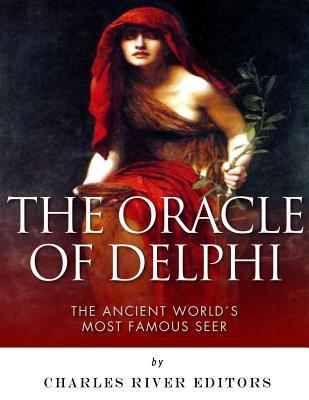*Includes ancient descriptions of the oracle
*Includes a bibliography for further reading
"Not often nor regularly, but occasionally and fortuitously, the room in which they seat the god's consultants is filled with a fragrance and breeze, as if the adyton were sending forth the essences of the sweetest and most expensive perfumes from a spring." - Plutarch
"[T]he seat of the oracle is a cavern hollowed down in the depths...from which arises pneuma [breath, vapor, gas] that inspires a divine state of possession." - Strabo, Geography 9.3.5
The Oracle of Delphi was one of the greatest religious institutions in Ancient Greece and one which played a significant role not only in the formation and collective decisions of Hellenic localities and city-states but also in the personal lives of Greeks known and unknown. The site was dedicated to the god Apollo, and the Greeks believed the god spoke his oracles through his prophetess known as the Pythia. The judgments and decisions rendered by the oracle were so important to the Greeks that they often put them above all other interests, even security threats posed by the likes of the Persians, and Delphi was popular even amongst outsiders. The Pythia delivered the god's oracles to such famous persons as Midas and Croesus, and it provided consultations during such important historical moments as the Persian War and the Peloponnesian War. Many authors of antiquity mention the oracle for one reason or another, and there even survive epigraphic collections that preserve the god's words on stone.
The ancient Greeks called Delphi the omphalos ("navel") of the Earth, and the black rock that symbolized this imagined center stands at the site to this very day. Sitting at the foot of Mt. Parnassos, Delphi overlooks the Gulf of Corinth, and it is no wonder why the setting mesmerized contemporaries. The majestic, almost magical, aspect of the site, bordered by precipitous cliffs and craggy footpaths on a hillside that is dotted with deep, dark caves and lined by gargling streams of pure water, never fails to inspire a sense of awe and wonder in its visitors, even to this very day.
Despite the oracle's fame and popularity, however, modern knowledge of Delphi remains limited in certain respects. Cultic history has become so intertwined with cultic myth that the lines separating one from another have been nearly lost. Modern scholars studying the oracle of Delphi have tried to pull the shroud of mythology away from historical facts to illuminate the realities of the Apolline cult, but the job has often proved trickier than imagined. If anything, the work of scholars has deepened the mysticism of Delphi rather than dispel it, in large measure due to documenting fascinating and mysterious stories about the oracle. Certain aspects of the Delphic cult will likely always be impossible to describe with any degree of accuracy or certainty, despite scholars' best attempts at imaginative reconstruction, because its foundation and function depended entirely upon religious belief in Apollo and his prophetic gift, which no amount of scholarship can fully explain.
The Oracle of Delphi: The Ancient World's Most Famous Seer examines the history and mysteries surrounding the influential Greek oracle, including the historical buildings of the site and the cultic traditions recorded by ancient writers, in an attempt to separate truth from fiction as much as possible. Along with pictures and a bibliography, you will learn about the Delphic Oracle like never before, in no time at all.
